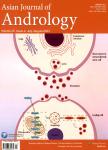What we have learned from randomized trials of prostate cancer screening
前列腺癌筛查随机试验带给我们什么?作者机构:Medicine Service New Mexico VA Health Care System Albuquerque NM 87108 USA Department of Medicine University of New Mexico School of Medicine Albuquerque NM 87108 USA Department of Surgery University of New Mexico School of Medicine Albuquerque NM 87108 USA
出 版 物:《Asian Journal of Andrology》 (亚洲男性学杂志(英文版))
年 卷 期:2011年第13卷第3期
页 面:369-373,510页
核心收录:
基 金:New Mexico VA Health Care System Albuquerque NM USA
主 题:cancer screening prostate-specific antigen prostatic neoplasms randomized controlled trials as topic
摘 要:The introduction of prostate-specific antigen (PSA) for prostate cancer screening in the late 1980s led to an epidemic of prostate cancer, particularly in developed countries. However, the first valid reports from randomized controlled trials on the efficacy of screening were not published until 2009. Men in the screening group in the European Randomized Study of Screening for Prostate Cancer were 20% less likely than those in the control group to die from prostate cancer. The absolute difference was only 0.7/1000, implying that over 1400 men needed to be screened to prevent one prostate cancer death. Screening was also associated with a 70% increased risk for being diagnosed with prostate cancer. The American Prostate, Lung, Colorectal, and Ovarian Cancer Screening Trial found no survival benefit for screening. Results were not conclusive because a substantial proportion of study subjects had previously undergone PSA testing, over half of the control group had PSA testing, follow-up was relatively short, and fewer than 100 subjects died from prostate cancer. Balancing the potential survival benefit from screening is the risk of overdiagnosis--finding cancers that would not otherwise cause clinical problems^and the risk of treatment complications, including urinary, sexual and bowel dysfunction. Prostate cancer screening efforts would benefit from improved biomarkers, which more readily identify clinically important cancers. Cancer control efforts might also need to include chemoprevention, though currently available agents are controversial. In the meantime, oatients need to be supoorted in achievine informed decisions on whether to be screened for orostate cancer.



